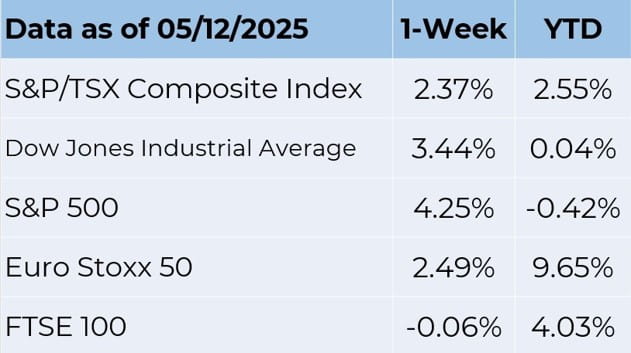Weekly Market Commentary May 19 2025
Canada's Economy Trouble
“We now face a new threat,” that’s the warning echoed by Bank of Canada Governor Tiff Macklem, as President Donald Trump’s tariffs threaten to knock Canada off the financial rails. The trade war, which has triggered uncertainty, is increasingly reshaping economic growth prospects and raising inflation on the heels of the central bank cutting interest rates.
Declining inflation rates, last year, made it possible to lower financial lending rates, which led to a decline in family debt and corporate insolvency. However, Trump's tariffs created a fear of an economic collapse. According to Macklem, the economy is steady right now, but it needs to be closely monitored to enable a response to changes.
The concerns were further exacerbated by a confirmation that the economy only added 7.4 thousand new jobs in April. While it was a significant improvement from a net loss of 32.6 thousand jobs in March, it still raises concerns about the long-term outlook, given the unemployment rate surged to 6.9%, the highest since November 2023.
This slow job growth has raised concerns over economic stagnation, and one major contributing factor is U.S. tariffs on Canadian exports, including steel, aluminum, and cars. As trade tensions rise, a swelling work population and poor employment numbers point to significant threats to Canada's economic stability.
Amid the economic growth uncertainty, the Canadian stock market remains in recovery mode, after the U.S. hit the country with a 25% tariff. The country’s main stock index, the Toronto Stock Index, is on the cusp of its all-time highs, erasing significant losses accrued for the better part of the year in April.
The TSX is only 1% off its all-time highs after shedding about 13% in April. The bounce back over the past month has come on the heels of gains in the mining and technology sectors. Better-than-expected corporate earnings have also helped fuel sentiments in the equity markets.
Nevertheless, the prospects of the U.S. making trade deals appear to be accelerating the bounce-back. Canadian stocks were also upbeat at the start of trading on Monday, after news of a 90-day war truce between China and the U.S. Any de-escalation between the two biggest economies is good news for the Canadian economy, which has been hit hard by the trade war. On the other hand, economists expect a June interest rate cut in the U.S. to drive investor sentiment, which will help the market's liquidity.
The Markets
The winds of uncertainty are blowing, and the waters are choppy.
“In recent weeks, United States stock markets saw steady gains, recovered from the April downturn as investors set aside uncertainty,” reported Connor Smith of Barron’s.
Last week, investors became more cautious as they considered:
Trade successes and negotiations. Last week, President Trump announced a trade deal with the United Kingdom and, over the weekend, U.S.-China trade negotiations began. “With talks between the U.S. and China about to start, trillions of dollars are hanging in the balance for American companies. The average member of the [Standard & Poor’s 500 Index] made 6.1% of its revenue from selling goods in China or to Chinese companies in 2024, according to an analysis from Bloomberg Intelligence’s Gina Martin Adams and Gillian Wolff,” reported Rita Nazareth of Bloomberg.
The outlook for the economy. Last week, the Federal Reserve left rates unchanged. Fed Chair Jerome Powell offered assurances that the economy is solid, the unemployment rate remains low, and inflation is closer to the Fed’s 2% goal but not there yet. In a post- meeting press conference, Powell stated,“…we’ve judged that the risks to higher employment and higher inflation have both risen [compared to March]…there’s a great deal of uncertainty...”
The outlook for company earnings. Companies in the S&P 500 Index performed well in the first quarter. Overall, the earnings growth rate for companies that have reported so far is 13.4%, reported John Butters of Factset. However, as Butters explained, analysts lowered [earnings per share] estimates more than normal for S&P 500 companies because of uncertainty, including a possible economic slowdown or recession.
Last week, major U.S. stock indexes finished flat to slightly lower. Yields on many maturities of U.S. Treasuries moved slightly higher over the week.

Source: FactSet
No, You Don’t Need to Stock Up On Toilet Paper.
During the pandemic, concerns about supply chains and shortages led some people to stock up on items like toilet paper. As it turns out, the frenzied buying may have been the cause of those shortages.
Today, people are concerned about items that are typically imported from other countries becoming scarce. Last week, Bloomberg published the “Ultimate Tariff Buying Guide” to help people understand “what to purchase right now, what to skip and what’s a maybe.” Claire Ballentine and Will Kubzansky of Bloomberg advised that “right now” purchases may include:
Kid stuff. A lot of the equipment parents rely on – car seats, strollers, cribs, toys – are made in China, so prices may rise significantly. Parents don’t have to worry about disposable baby care items, as “diapers, wipes and most infant formulas won’t see a huge impact from tariffs because the majority of these products are manufactured domestically.”
Computers, smart phones, and electronics. While these goods, currently, are exempt from reciprocal tariffs, they are subject to other types of tariffs. If you have a student headed to college in the fall who will need electronics or you’re considering replacing your current smartphone, tablet, or computer, you may want to accelerate the purchase.
Automobiles. “If you already planned to buy a car sometime in 2025, bringing your purchase forward a few months could save you thousands of dollars,” according to a source cited by Ballentine and Kubzansky.
It’s a good idea to be prepared for higher costs if you’re planning to travel outside of the United States, too. “Due to tariffs shaking global markets, the [U.S.] dollar has weakened this year. That downward trend shows no signs of subsiding, so international travelers should expect worse deals when scoping out a trip or traveling abroad,” reported Ballentine and Kubzansky.
Weekly Focus – Think About It
"If you know the enemy and know yourself, you need not fear the result of a hundred battles. If you know yourself but not the enemy, for every victory gained, you will also suffer a defeat. If you know neither the enemy nor yourself, you will succumb in every battle."
– Sun Tzu, Military strategist
Best regards,
Eric Muir
B.Comm (Hons. Finance), CIM®, FCSI
Senior Portfolio Manager
Derek Lacroix
BBA, CIM®, CFP®
Associate Portfolio Manager

P.S. Please feel free to forward this commentary to family, friends or colleagues. If you would like us to add them to the list, please reply to this email with their email address and we will ask for their permission to be added.
Disclaimer:
Information in this article is from sources believed to be reliable, however, we cannot represent that it is accurate or complete. It is provided as a general source of information and should not be considered personal investment advice or solicitation to buy or sell securities. The views are those of the author, Eric Muir and Derek Lacroix and not necessarily those of Raymond James Ltd. Investors considering any investment should consult with their Investment Advisor to ensure that it is suitable for the investor’s circumstances and risk tolerance before making any investment decision. Raymond James Ltd. is a Member Canadian Investor Protection Fund.

